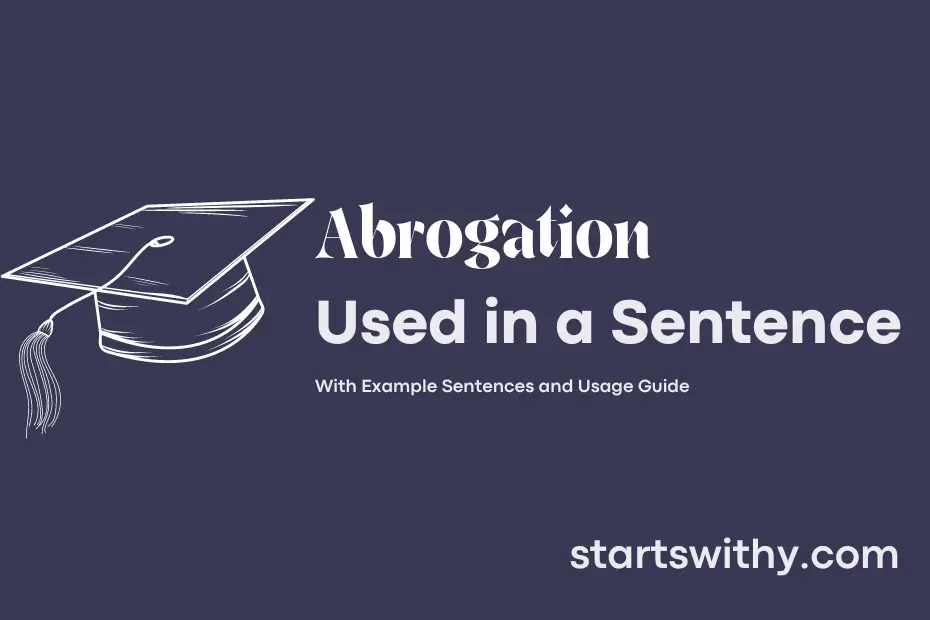Have you ever come across the term “abrogation” while reading legal documents or religious texts and found yourself puzzled by its meaning? In simple terms, abrogation refers to the act of repealing or annulling a law, agreement, or custom.
This concept is commonly used in various fields, such as law and theology, to denote the cancellation or withdrawal of a previously established rule or principle. Understanding how abrogation operates can shed light on the dynamics of decision-making processes and the evolution of regulations.
7 Examples Of Abrogation Used In a Sentence For Kids
- The abrogation of a rule means it is taken away.
- Sometimes, laws can be changed through abrogation.
- In history, there have been many cases of abrogation of old laws.
- The word abrogation is used to talk about cancelling rules.
- The process of abrogation can make new rules in place of old ones.
- People use abrogation to make things fair for everyone.
- We can learn about abrogation when we study how rules are made and changed.
14 Sentences with Abrogation Examples
- Abrogation of the existing policy has raised concerns among the student community.
- The sudden abrogation of the scholarship program left many students in a state of uncertainty.
- The university’s decision of abrogating the hostel rules was met with mixed reactions from the students.
- The management’s announcement of abrogating the extra-curricular activities was disappointing for many students.
- The government’s move of abrogating the reservation policy sparked protests among the college students.
- Abrogation of the mandatory attendance rule was welcomed by some students but opposed by others.
- The college’s decision to abrogate the fee hike came as a relief to the financially struggling students.
- The sudden abrogation of the exam schedule caused chaos among the students.
- The principal’s announcement of abrogating the dress code policy was met with joy by the students.
- The abrogation of the canteen contract led to a decline in the quality of food available on campus.
- Abrogation of the seminar on mental health awareness disappointed many students who were looking forward to it.
- The faculty’s decision to abrogate the use of mobile phones in class was met with resistance from the students.
- The management’s abrogation of the Wi-Fi facility in the campus library hindered students’ access to online resources.
- The sudden abrogation of the internship placement program left many students scrambling to find alternative opportunities.
How To Use Abrogation in Sentences?
To use Abrogation in a sentence, start by understanding that Abrogation is a term used to refer to the act of repealing or cancelling something, typically a law, treaty, or agreement. When incorporating Abrogation in a sentence, follow these simple steps:
-
Identify the context: Determine the subject matter or situation in which the term Abrogation can be appropriately used. For example, discussing legal matters, legislative processes, or contractual agreements may provide suitable contexts.
-
Select the appropriate form: Choose the form of Abrogation that best fits the context. It can be used as a noun (e.g., “The abrogation of the outdated law was met with mixed reactions.”) or as a verb (e.g., “The committee voted to abrogate the obsolete policy.”)
-
Contextualize the sentence: Frame the sentence in a coherent and logical manner that clearly conveys the meaning of Abrogation within the context. Ensure that the sentence is grammatically correct and effectively communicates the act of repealing or cancelling.
-
Revise and refine: Review the sentence to verify that Abrogation is used correctly and effectively in conveying the intended meaning. Make any necessary revisions to improve clarity and coherence.
By following these steps, beginners can confidently incorporate Abrogation in their sentences to accurately convey the concept of repeal or cancellation in various contexts.
Conclusion
In conclusion, the concept of abrogation refers to the act of repealing or revoking a law, treaty, or agreement. Throughout history, various instances of abrogation can be observed, such as when a new law overrides an existing one or when a treaty is terminated by mutual agreement. In legal and diplomatic contexts, the process of abrogation plays a crucial role in shaping and evolving governing principles.
Understanding the implications of abrogation is essential for anyone involved in legal matters, policymaking, or international relations. It underscores the dynamic nature of laws and agreements, highlighting the need for continuous review and adaptation to changing circumstances. By examining the different examples of abrogation, one can grasp the significance of this process in shaping legal frameworks and relationships between entities.



